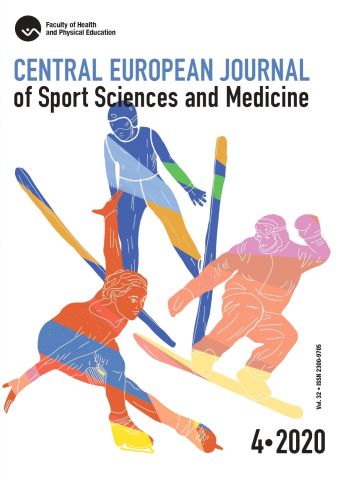
ISSN: 2300-9705
eISSN: 2353-2807
OAI
DOI: 10.18276/cej.2020.4-07




Lista wydań /
Vol. 32, No. 4/2020
Online coach development and certification programs in sports: are they possible?
| Autorzy: |
Konstantinos G.
Papageorgiou
Department of Informatics, Ionian University, Corfu, Greece |
| Słowa kluczowe: | online learning distance education tennis distal method technique |
| Data publikacji całości: | 2020 |
| Liczba stron: | 7 (69-75) |
Abstrakt
Anticipating the inevitable shift of coach education and Coach Certification Programs (CCP) to distance-learning platforms in the imminent future, I have attempted to identify obstacles that we are likely to face. After explaining the rationale and the potential benefits of such courses, I have identified technique as the most difficult component to both teach and evaluate. A specific viewpoint regarding technique is briefly discussed and several related guidelines are provided to assist in both teaching (coach education) and evaluating technique (CCP) within the context of distance education.
Pobierz plik
Plik artykułu
Bibliografia
| 1. | Born, P., Nguyen, N.P., Grambow, R., Meffert, D., Vogt, T. (2018). Embedding tennis-specific teaching videos into long-term educational concepts to improve movement learning and technique performances. Journal of Physical Education and Sport, 18 (1), 255–261. doi: https://doi.org/10.7752/jpes.2018.01034. |
| 2. | Brooks, A.J., Maizes, V., Billimek, J., Blair, J., Chen, M.-K., Goldblatt, E., … Lebensohn, P. (2020). Professional development in integrative health through an interprofessional online course in clinical settings. EXPLORE. doi: https://doi.org/10.1016/j.explore.2020.02.014. |
| 3. | Cain, T. (2015). Teachers’ engagement with published research: addressing the knowledge problem. Curriculum Journal, 26 (3), 488–509. doi: https://doi.org/10.1080/09585176.2015.1020820. |
| 4. | Campbell, T., Sullivan, P. (2005). The Effect of a Standardized Coaching Education Program on the Efficacy of Novice Coaches. AVANTE, 11 (1), 38–45. |
| 5. | Collins, H., Evans, R. (2007). Rethinking expertise. Chicago: The University of Chicago Press. |
| 6. | Collins, H.M., Evans, R. (2002). The Third Wave of Science Studies: Studies of Expertise and Experience. Social Studies of Science 32/2, 2 (2), 235–296. |
| 7. | Haslam, I.R. (1990). Expert assessment of the national coaching certification program (NCCP) theory component. Canadian Journal of Sport Sciences = Journal Canadien Des Sciences Du Sport, 15 (3), 201–212. |
| 8. | Jia, M., Gong, D., Luo, J., Zhao, J., Zheng, J., Li, K. (2019). Who can benefit more from massive open online courses? A prospective cohort study. Nurse Education Today, 76, 96–102. doi: https://doi.org/10.1016/j.nedt.2019.02.004. |
| 9. | Kai-Sim, L., Malete, L., Feltz, D.L. (2002). The Strength of Coaching Efficacy Between Certified and Noncertified Singapore Coaches. International Journal of Applied Sports Sciences, 14 (1), 55–67. |
| 10. | Lifelong Learning Definitions. Retrieved from: https://coach.ca/lifelong-learning-definitions (10.04.2020). |
| 11. | Mccullick, B.A., Belcher, D., Schempp, P.G. (2005). What works in coaching and sport instructor certification programs? The participants’ view. Physical Education & Sport Pedagogy, 10 (2), 121–137. |
| 12. | McIntyre, D. (2005). Bridging the gap between research and practice. Cambridge Journal of Education. doi: https://doi.org/10.1080/03057640500319065. |
| 13. | McQuade, S. (2020). Current Models of Coach Education, Training, and Certification. In: K. Dieffenbach, M. Thompson (eds), Coach education essentials (p. 448). Human Kinetics. |
| 14. | Misener, K.E., Danylchuk, K.E. (2009). Coaches’ Perceptions of Canada’s National Coaching Certification Program (NCCP): Awareness and Value. International Journal of Sports Science & Coaching, 4 (2), 233–243. |
| 15. | Ortega-Morán, J.-F., Pagador, B., Maestre-Antequera, J., Arco, A., Monteiro, F., Sánchez-Margallo, F.M. (2020). Validation of the online theoretical module of a minimally invasive surgery blended learning course for nurses: A quantitative research study. Nurse Education Today, 89, 104406. doi: https://doi.org/10.1016/j.nedt.2020.104406. |
| 16. | Papageorgiou, K.G. (2020a). Online Coach Development Components: the Tennis Distal Method Coach Development. Pedagogy, 92 (7s), 17–28. |
| 17. | Papageorgiou, K.G. (2020b). On Sports Biomechanics Methodology. Epistēmēs Metron Logos, (4), 50–61. doi: https://doi.org/10.12681/eml.24289. |
| 18. | Rizzolatti, G., Fadiga, L., Gallese, V., Fogassi, L. (1996). Premotor cortex and the recognition of motor actions. Brain Research. Cognitive Brain Research, 3 (2), 131–141. |
| 19. | Sabock, R. (1981). Professional preparation for coaching. Journal of Physical Education, Recreation and Dance, 52 (8), 10. |
| 20. | Schweitzer, C. (1989). Coaching Certification. ERIC Digest. Retrieved from: www.eric.ed.gov. |
| 21. | Terrace, H.S. (2001). Chunking & Serially Organized Behavior in Pigeons, Monkeys and Humans. Retrieved from: http://www.pigeon.psy.tufts.edu/avc/terrace/ (4.09.2013). |
| 22. | Zheng, B., Lin, C.H., Kwon, J.B. (2020). The impact of learner-, instructor-, and course-level factors on online learning. Computers and Education, 150, 103851. doi: https://doi.org/10.1016/j.compedu.2020.103851. |